Episodes
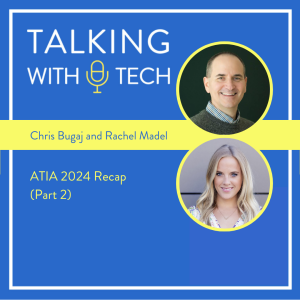
Thursday Feb 15, 2024
Thursday Feb 15, 2024
This week, Rachel and Chris continue their discussion about the highlights and takeaways from ATIA 2024! They share some of their favorite presentations and poster sessions from Lauren Enders, Brenda Del Monte, Bruce Alter, Tina & Mateo Moreno, Karanveer Singh, EdTech, and more!
Key Ideas this Week:
🔑 The Joy Zabala Fellowship is an organization that supports early career professionals working with students with disabilities by connecting them with a seasoned mentor. The mentee and mentor work together to strengthen the skills of the mentee and, afterwards, to share what they learned with the larger stakeholder community.
🔑 At a session on AI, Chris asked Bruce Alter if we should still be teaching students to code or if we should only be teaching them to use AI to write the code for them. Bruce replied that “not an either/or question, it’s an ‘and’ question.” Students need to learn to code, and also to effectively use AI to write code. A student can’t understand what code the AI has given them or correct bugs if they have no idea how to code themselves.
🔑 EdTech is a session where people ask questions and then the group splits up into different parts of the room to have breakout discussions on some of the topics posed. This year, Rachel really enjoyed discussing supporting creativity in education. Rachel utilizes a lot of creative arts in her therapy activities. It’s nice, because the client is motivated to be creative and the family gets to see what they made afterwards.
🔑 One theme at ATIA this year was the Specific Language System First Approach, which was created by Chris himself! Chris has recently created an online class about the specific language system first approach - learn more here!
Visit talkingwithtech.org to listen to previous episodes, find new resources, and more!
Help us develop new content and keep the podcast going strong! Support our podcast at patreon.com/talkingwithtech!
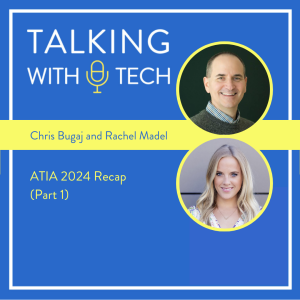
Thursday Feb 08, 2024
Thursday Feb 08, 2024
This week, we share Part 1 of Chris and Rachel’s recap of their recent trip to ATIA 2024! Chris and Rachel discuss a recent change to ATIA’s venue, share resources and takeaways from the conference, talk about what they covered in their own sessions, and more!
Key Ideas this week:
🔑 A lot of discussion at ATIA was about “Assistive Technology Myths and Facts” from the Office of Special Education Programs and the National Educational Technology Plan for 2024. They could be helpful as tools to demonstrate what you are sharing about AAC is supported by the federal government.
🔑 At his presentation, Lance McLemore shared about fear and anxiety using his device with unfamiliar people. For an AAC User, they don’t always know if the other person will do things like provide sufficient wait time. If you support an AAC User, be cognizant that an unfamiliar communication partner could be a possible source of stress.
🔑 Chris got to connect with Amanda Hartman, who is the author of two children’s books about AAC, “AAC Rhyme Time” and “I Talk in Different Ways”. It could be used, for example, to introduce a classroom to AAC, build phonological awareness, or support literacy!
🔑 One thing to look into if you work with students - are the accessibility settings enabled or disabled by default on student computers and devices? Many students need things like text-to-speech, but enabling it requires several hurdles through the IT department (or they are totally locked out).
Visit talkingwithtech.org to listen to previous episodes, find new resources, and more!
Help us develop new content and keep the podcast going strong! Support our podcast at patreon.com/talkingwithtech!
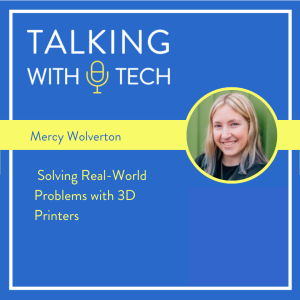
Wednesday Jan 31, 2024
Wednesday Jan 31, 2024
This week, we share our interview with Mercy Wolverton! Mercy is a student at George Mason University who learned how to use her 3D printer in high school during a senior project seeking to solve real world problems! Mercy shares some of the websites and resources that she used to learn how to print in 3D, and how you can get started as quickly and inexpensively as possible!
Before the interview, Chris and Rachel briefly tease takeaways from their time at ATIA, and talk about a recent email from Brian Whitmer about a google form about the state of AAC in 2024.
Key Ideas this Week:
🔑 Mercy says, when you are learning 3D printing, don’t be afraid of mistakes! It can take several tries to figure out how to make something with a 3D printer, and approaching these mistakes with a growth mindset can help us think of it as a learning opportunity!
🔑 There are 3D printers that are available to use for free at universities, schools, and libraries. If there is someone there who knows how to use the printer, they may be really helpful troubleshooting problems using it.
🔑 Mercy created a website for the work she has done at mercywolverton.com. On her site, Mercy shares about her coding and 3D printing projects and some of her interests. Chris shares why he loves that idea, and why more people should create a website to showcase their interests and projects.
Links from the Episode
3D Printing Resources: Thingiverse (thingiverse.com), Tech Owl (techowlpa.org/3d-printing-at), & Makers Making Change (www.makersmakingchange.com)
Brian Whitmer on TWT discussing Open AAC: https://www.talkingwithtech.org/episodes/brian-whitmer
Open AAC’s State of AAC survey, collecting feedback on the state of AAC over the last year
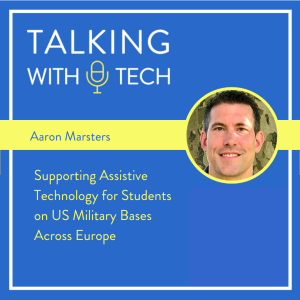
Wednesday Jan 24, 2024
Wednesday Jan 24, 2024
Trigger Warning: This week’s banter includes some descriptions of trauma. If you would prefer to only listen to this week’s interview, please skip ahead to 27:19.
This week, Chris interviews Aaron Marsters, an Assistive Technology Instructional Systems Specialist for Department of Defense Education Activity (DoDEA)! Aaron shares about his role supporting the assistive technology needs of students on military bases across Europe, in his case, particularly in Germany. He shares ideas about AI and AAC, ways they collaborate to share implementation across Europe, and how they have adopted the Specific Language System First approach on bases across Europe!
Before the interview, Rachel tells a heartbreaking story about one of her clients who is currently in a child psychiatric ward. Her client is an AAC User, and Rachel shares about how the child has been mistreated despite the family’s best efforts to help. Chris and Rachel share their collective worry for Rachel’s client and their desire for his treatment to improve.
Key Ideas this Week:
🔑 We need to look at how we can better educate staff at medical facilities where people can be detained, like psychiatric wards, on how to work with people with complex communication needs and how to better support the needs of autistic people. We need to have an approach of curiosity instead of fear when someone is a multi-modal communicator, especially if they have a history of aggressive or self-injurious behavior.
🔑 When a complex communicator arrives within Europe’s DoDEA schools on military bases, Aaron makes sure that there are licenses of LAMP:WFL and multiple licenses of AAC Language Lab for each student. Then, the AT and school teams look at what stage learner the AAC user is and they go over activities and lessons the school can use to support that student’s AAC and language development.
🔑 If Aaron’s AT team tries something for one school, they take what worked and share it out with everyone else within the DoDEA European schools. There is a central website where best practices and implementation strategies are shared for every European DoDEA school!
Visit talkingwithtech.org to listen to previous episodes, find new resources, and more!
Help us develop new content and keep the podcast going strong! Support our podcast at patreon.com/talkingwithtech!

Thursday Jan 18, 2024
Thursday Jan 18, 2024
This week, we share TWT's 300th Episode/1 Million Downloads Celebration! The whole TWT team (Rachel, Chris, Luke Padgett, Michaela Ball, and Monica Halchishick) gathered virtually with some of the coolest people we know (i.e. listeners and previous guests) to chat with us about AAC as we celebrate our our recent 1 millionth download! The TWT team and listeners share memories of making the podcast, stories of how the podcast has influenced their life, favorite strategies, possible future episode topics, and more!
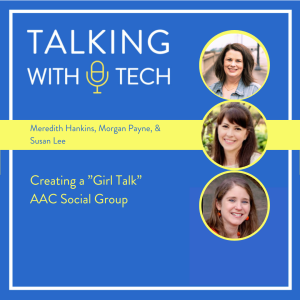
Wednesday Jan 10, 2024
Wednesday Jan 10, 2024
This week, we hear Chris’s interview with Meredith Hankins, Morgan Payne, and Susan Lee! Morgan is the mother of an 11 year old girl, Sophie, with Cerebral Palsy who uses AAC. Susan has a daughter, Alyssa, with Rett Syndrome who also uses AAC. Meredith is an AAC Specialist with United Ability in Alabama who works with their daughters and helped to bring them together in new ways! These three share about how the idea for a “Girl Talk” group came up organically in community-based therapy and eventually grew to become a weekend camp at Dolphin Island Sea Lab organized by Susan!
Before the interview, Rachel and Chris answer a Patreon user’s question about creating a “best buddies” club for general education and special education peers at a high school site! They discuss the importance of setting up an authentic peer interaction, ideas for fun activities that all the students can enjoy, making the project student led, and more!
Key Ideas this week:
🔑 Students will often communicate differently with peers compared to staff and teachers. Family and therapists don’t always think about the impact a peer communication partner can have on an AAC User’s motivation to communicate and have fun!
🔑 Morgen and Susan say, if you want to find opportunities for your child like communication camps, check with therapists, doctors at children hospitals, and parents of children with similar needs to help expand your network and find new opportunities.
🔑 Susan took all she has learned as a teacher and mother and helped to create Camp Speak, www.campspeak.org, an overnight camp in Georgia for AAC users 5-18!
Visit talkingwithtech.org to listen to previous episodes, find new AAC resources, and more!
Help us develop new content and keep the podcast going strong! Support our podcast at patreon.com/talkingwithtech!
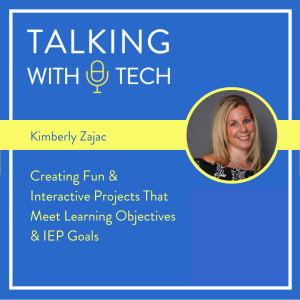
Friday Jan 05, 2024
Friday Jan 05, 2024
Kim Zajac is an SLP and audiologist is a Communication Specialist in Norton Public Schools in Massachusetts, working with grades 6-12. Kim is also an associated professor at Emerson and is a member of the board of MassCUE, the Massachusetts chapter of ISTE. Kim shares some of her strategies for making teaching and therapy sessions more inclusive, interactive, and engaging for all students!
Before the interview, Chris and Rachel discuss some takeaways from ASHA 2023, including increased discussions about MTSS in school districts. Rachel shares about a session by Tiffanie Joseph (nigh.functioning.autism) that was a highlight, as well as some of her takeaways from that session!
Key ideas this week:
🔑 Kim takes a student-driven approach that addresses the student’s goals, but in a more experiential way, such as creating a board game with a group to work on things like grammar and higher order thinking.
🔑 Students often are more motivated to work in class when they have an authentic problem to solve, and it often helps students to reflect on themselves and their future in ways they would not with a more abstract question.
🔑 Kim uses self assessment rubrics to help students keep track of the goals they are working on. Sometimes, when they have the skill mastered, Kim will add a group mate for the student to track as well. She will also use rubrics to grade the projects the students create.
Links from this week's episode:
MassCue - masscue.org
Vocaroo - https://vocaroo.com/
Adobe Firefly - https://www.adobe.com/products/firefly.html
MidJourney - https://www.midjourneyai.ai/
BlueWIllow - https://www.bluewillow.ai/
Dall-E 2: https://openai.com/dall-e-2
Gimkit - gimkit.com
Kahoot - kahoot.com
Innovator’s Compass - innovatorscompass.org
Mary Howard: ChatGPT Guide for Educators - https://www.goodreads.com/book/show/200832186-the-chatgpt-guide-for-educators
Donnie Pearce: Tips for Integrating AI in the Classroom - https://www.amazon.com/50-Strategies-Integrating-into-Classroom/dp/B0C5G74W4N
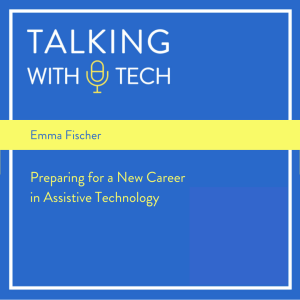
Wednesday Dec 13, 2023
Wednesday Dec 13, 2023
This week, Chris interviews Emma Fischer, a special education teacher in Culpeper County, Virginia who supports students in an adapted curriculum program. She enjoys supporting her student’s use of robust AAC, and she wanted to ask Chris about next steps in moving to a career in assistive technology, including possible Master’s Degree options and possible job roles!
Before the interview, Chris and Rachel share an incredible Q&A session with a special guest who has a lot to say about on putting together a good presentation on coaching and AAC!
Key Ideas This Week:
🔑 If you want to transition into an assistive technology role, you may want to consider moving to another area of the country if a job opens up. Typically, there is limited turnover in most AT roles, and it is possible you could go get a Master’s Degree in Assistive Technology and not have a position open in your area.
🔑 Consider Educational Technology as an alternative to assistive technology. There are more Ed Tech jobs than assistive technology jobs overall, and as an educational technology coach you can support all students, including students who have learning needs but are not in special education.
🔑 School administrators can have a really big impact with students, especially if you come from a place of knowledge about AAC and inclusion. Many people say the issue with their admin is their admin’s mindset, not an issue related to mine. Having an admin that understands disability advocacy could be really good. Big trade off is you don’t get to work directly with students as much with.
🔑 There is an artificial line with assistive technology and educational technology where someone has to be in special education to get assistive technology in many cases. As an educational technology coach, you can work with all the students, including people in special education and students who have unidentified learning problems.
Visit talkingwithtech.org to access previous episodes, resources, and CEU credits that you can earn for listening to TWT episodes!
Help us develop new content and keep the podcast going strong! Support our podcast at patreon.com/talkingwithtech!
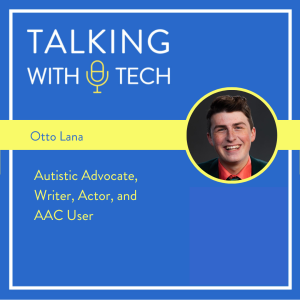
Wednesday Dec 06, 2023
Wednesday Dec 06, 2023
This week, Chris and Rachel interview Otto Lana (@otto_types), an autistic advocate who uses multiple modalities, including AAC, to communicate. Otto is also an intern at Kindred Communication (gokindred.com), which specializes in providing speech, language, and AAC coaching services. Otto shares about his AAC journey, why he believes literacy and typing skills need to be more emphasized for AAC users, his preference for positive instead of neutral or negative terms (i.e. nonspeaking) to refer to people with complex communication needs, and more!
Before the interview, Chris and Rachel banter (in the same room!) about how they try to keep an open mind when dealing with information that doesn’t agree with what they have heard before, and how that approach helps them stay current with many of the changes in the field over the years.
Key ideas this week:
🔑 If a person requires a wheelchair, are they called non walking? If a person has prosthetics, are they called non legged? Otto prefers “individuals with complex communication needs” or “multi-modality communicators.” Otto says the prefix “non” is negative. He wants to focus on positive or neutral terms, because “using deficit terms is derogatory and degrading.”
🔑 Otto believes that AAC systems that do not include a keyboard are “electronic PECS” because they are typically used to request and the words are predetermined by the adults in the room.
🔑 Otto says “Communication is a basic human right, and freedom of expression is a First Amendment right, but teaching civil rights or constitutional rights to special ed students doesn’t happen. If it did, there would be a whole new level of protesting” about how these students are treated.
🔑 Otto says to AAC users everywhere, “Don’t give up, it is hard work. Find friends who also use AAC. Be patient, be positive, trust in the process - you can do it!”
Links from this week’s episode:
Otto’s website - ottosmottos.com
Kindred Communication - gokindred.com
Recent article about Otto: https://canvasrebel.com/meet-otto-lana/

Sunday Nov 26, 2023
Sunday Nov 26, 2023
This week, we share Chris and Rachel’s interview with Rémi Morin, father of a daughter who uses AAC user full time, a daughter who uses AAC part time, and a daughter who does not use AAC. He shares some of his many insights gained as the parent of an AAC user, including how he came across AAC as an option of this daughters, and, when he couldn’t find a Canadian French version of LAMP Words for Life, he created his own!
Before the interview, Chris shares about a recent experience he had as moderator for a panel of students to talk about their disabilities for the State Educational Technology Director’s Association, including the standing ovation at the end for the students!
Sometimes, Rémi’s daughter who uses AAC full time needs a lot of modeling of a word before she will use it, and she often needs to see it in multiple contexts. Rémi says he must be “tenacious” when teaching her words.
Key ideas this week:
🔑 If you go out in the world looking for a language resource and you can’t find it, that is a sign that you could potentially make that resource to help yourself and, in the future, share it with everyone else who may need the same resource.
🔑 They will be rolling out Rémi’s French translation of LAMP to everyone in French Canada, with a possible rollout to other countries in the future!
🔑 Rémi’s perfect AAC software would be web based, and would work with all the Android and iOS devices they use in the home, including phones.
🔑 When we say someone’s “AAC system”, that should be the sum of the different means of communication for a person, not just one AAC app. A person’s system could include multiple high tech apps, low tech solutions like core boards, pen and paper, and more!
Link’s from this week’s episode:
CAST.org - the group that came up with universal design for learning and, more recently, worked with Chris to create his student-led panel.
PRC Article on Rémi’s Canadian French LAMP Words for Life
Visit talkingwithtech.org to access previous episodes, resources, and CEU credits that you can earn for listening to TWT episodes!
Help us develop new content and keep the podcast going strong! Support our podcast at patreon.com/talkingwithtech!
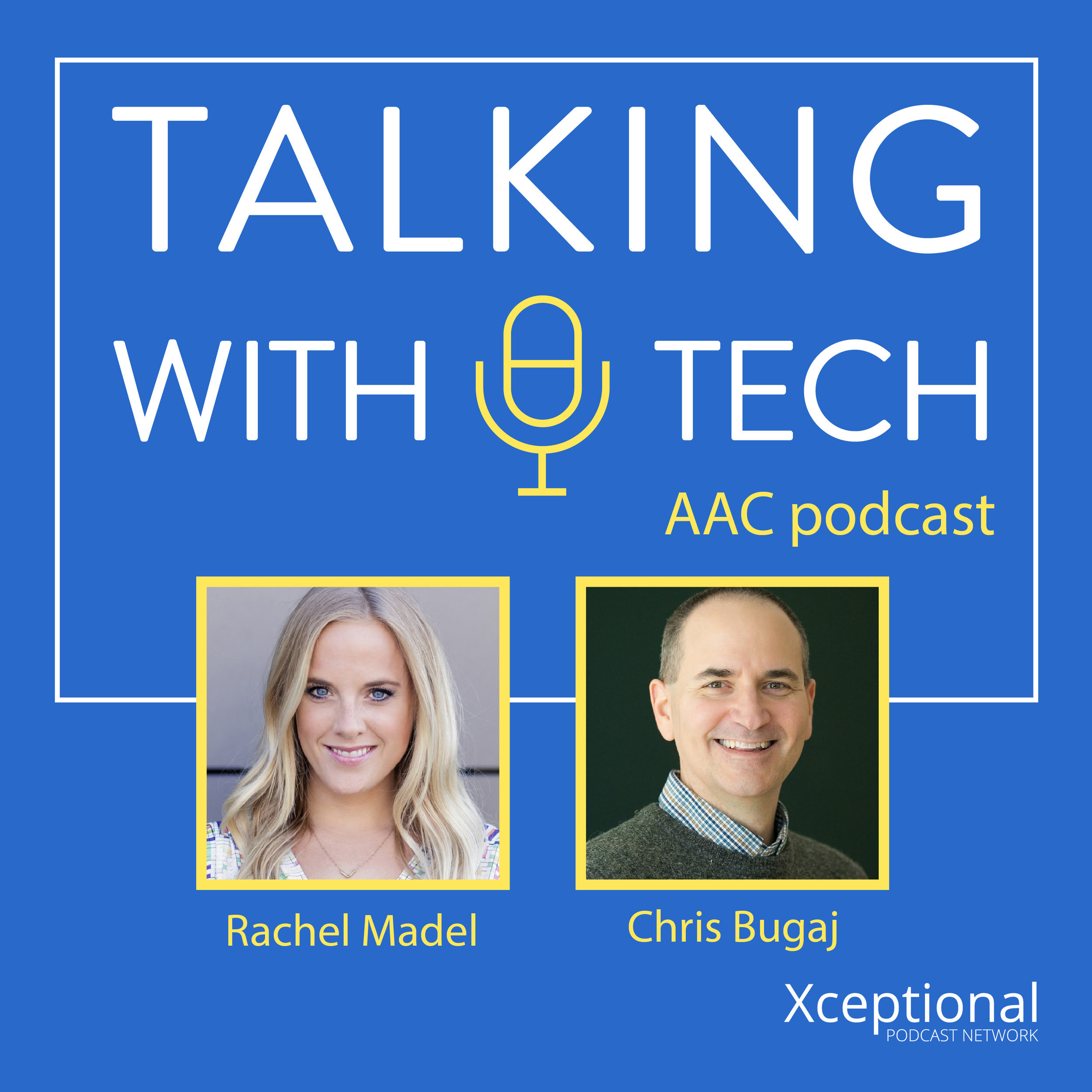
Join AAC experts Rachel Madel and Chris Bugaj as they dive into a weekly discussion about all things AAC (Augmentative and Alternative Communication). Every episode they deliver practical resources, clinical guidelines and relevant research to help clinicians better utilize technology for individuals with complex communication needs.
Episodes include interviews with industry thought-leaders, clinicians, parents, researchers and app developers to keep you on the pulse of the educational technology scene and better support communication through the use of technology.


